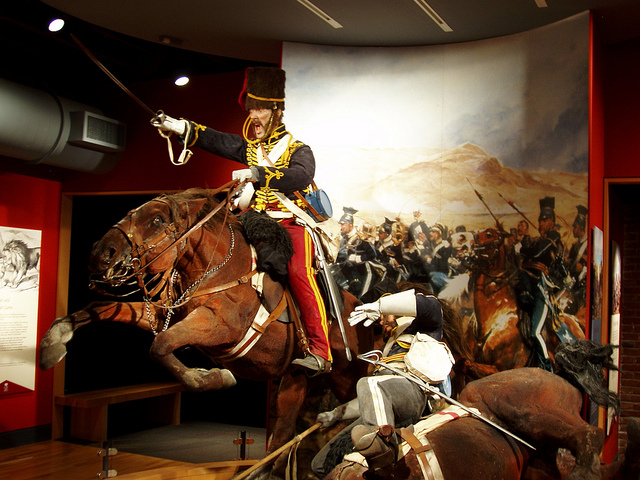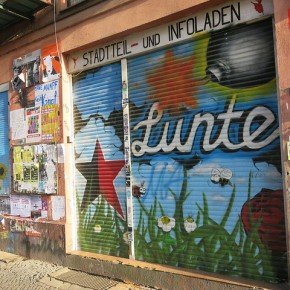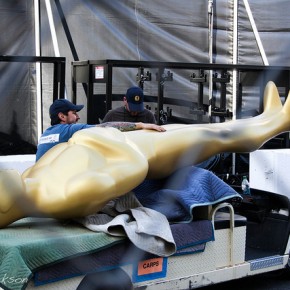Britain has invaded or occupied or at some point laid claim to virtually every spot of earth on the planet. So it should not be surprising that British boots once trod the otherwise obscure Ukrainian peninsula which is today attracting so much attention. What’s interesting is that Crimea has such cultural resonance in Britain, and why.
Many parts of the world in which the British have fired shots in anger have slipped from popular memory in the United Kingdom. The Opium Wars against China, Anglo-Afghan Wars, the Zulu Wars and the Indian Mutiny are all much less remarked upon then Crimea, and names connected with the 1853-1856 conflict endure alongside it.
For example, those of personalities like Florence Nightingale and Mary Seacole, place-names like Balaklava and Sebastopol and of events charge of the Light Brigade against banks of Russian guns, later immortalised in poetry by Tennyson.
I suspect this is partially because the name Crimea has cropped up in the middle of an engineered burst of martial nostalgia. It’s one hundred years since the start of the First World War, and the Afghanistan occupation is in its thirteenth year. But there is more to it than this. Despite being a victory for the British and their unlikely multinational partner France, that particular Victorian conflict was what General Wellington would have called a damned close run thing. It was a story of command blunder, supply scandal, and most importantly, a painful and public laying bare of British imperial limitations. It is along these lines that history is repeating itself today.
The Crimean War did serious damage to the aura of invincibility the British had won at Waterloo. As death rates from disease, exposure, malnourishment and secondary infections to battle casualties soared in a British army ill-equipped for a Crimean winter, the archaic and outmoded nature of British military logistics and the capacity of its generals to err was revealed. What was radical and new was that imperial emasculation came about through a potent medium which was at that time reaching new heights. The Crimean saw a new species of war correspondents sending rapid, regular, detailed and largely uncensored dispatches to a highly literate audience at home.

The effects of such reportage on the population were electric, and proved extremely awkward for politicians and generals. The war was the first in which mass outpourings of public sympathy for “Our Boys” gave serious pause to the governing classes. Indeed, the combination of inefficient military practices – and of a new and penetrating journalism exposing which was exposing it – left the British ruling class in disarray. The aftermath of the war was typified by squabbling generals and politicians trying to buck pass and apportion blame to each other. Crimea was a scandal of Britain’s own making.
Fast forward to 2014, and the rapidly developing Russian takeover of Crimea. Naturally, with Iraq and Afghanistan in mind, any talk of sending British or US troops to oppose Russian ones was quickly shushed, and seems to have been limited only to the most blustering of hawks. The British political class can do little more than look on and make lame references to “potential consequences” for Russia as they are once again outplayed by Vladimir Putin.
One reason for this is that Britain has shot itself in the foot as a global power. In its partnership with the US, Britain has repeatedly and blatantly done in the Muslim world what Russia is currently in the process of doing in Crimea. This leaves the likes of UK Foreign Secretary William Hague and US Secretary of State John Kerry in the position of being unable to legitimately criticize Putin’s so far bloodless imperial antics.
Secondly, Britain has put itself at the mercy of Russia on domestic terms by way of the profit motive. A document came to light this week, after being photographed in the hands of a government security advisor, which confirmed that Russian business is considered vital and will continue to be welcome in the City of London. Additionally, just a few months ago, the British media was reporting a lucrative Anglo-Russian arms deal – one which still appears to be intact. Military action and serious sanctions seem to be out of the question.
For the second time, Crimea has by some quirk of history and geopolitics, presented Britain with a particularly jarring imperial reality check. Though the governing classes must surely agree that it is far better that we know this now, rather than finding out once there is an army in the field.
Photographs courtesy of Damian Entwistle and the Republic of Crimea. Published under a Creative Commons license.





